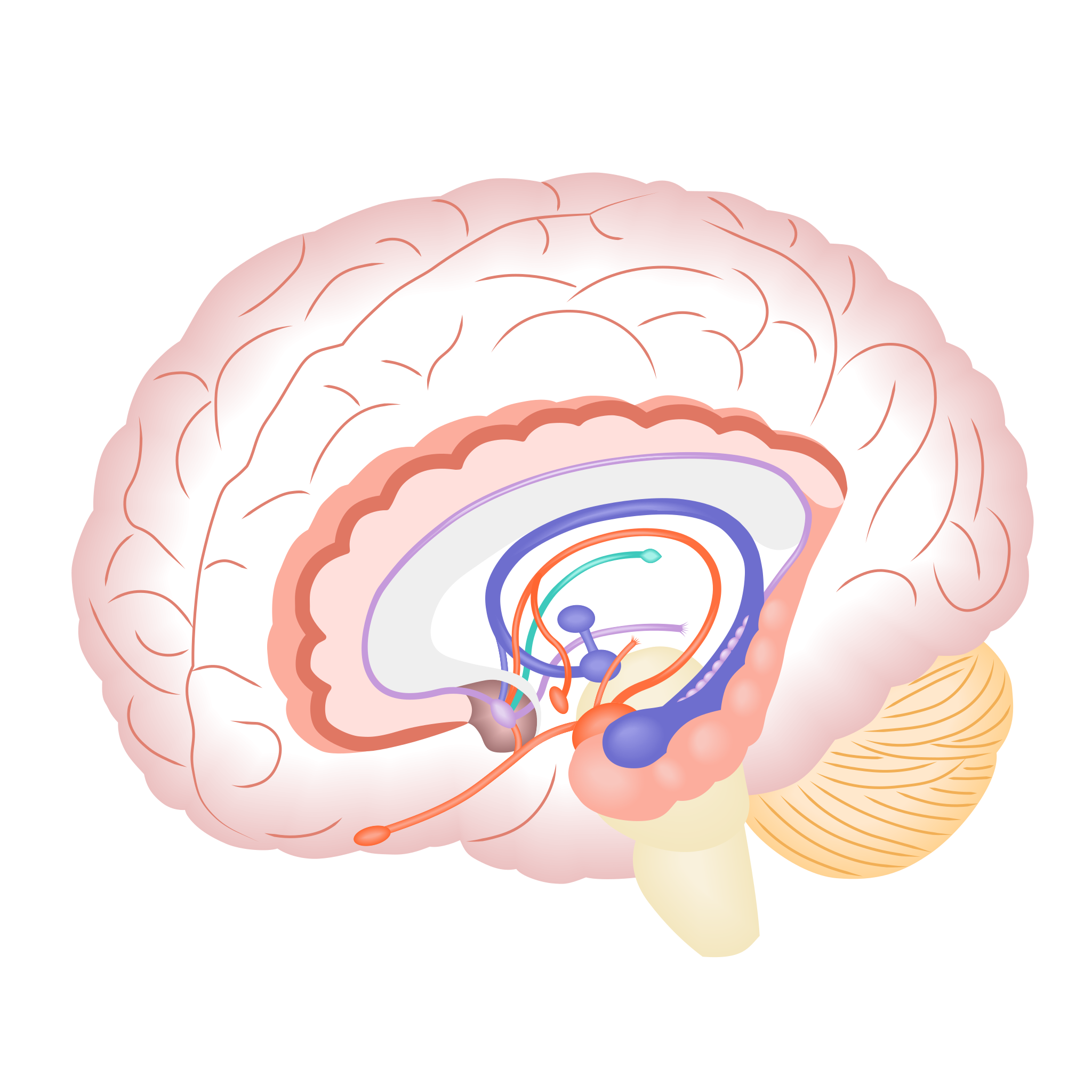
Brain and Neurotransmitters
Let’s talk about the brain, in super-simple terms.
There are three main parts. The Cortex (the outer “squiggly” part of our brains), the Limbic System (structures in the center of the brain) and Brainstem (right at top of the spinal cord).
Anyone in a profession even tangentially close to medicine or biology is probably cringing right now. Just bear with me…it will all be ok.
The Cortex is very involved in most higher functions, such as decision making, critical thinking, learning and so on. It is the part of our brain that allows us to self-actualize, to know that we are something different from our environment, to assign utility to things and apply critical thinking. From an evolutionary perspective it is a newer part of our brain, having really made huge advancements in growth and complexity over the last 1–2 million years, and we share similarities in structure with other oxygen-breathing advanced mammals such as apes and dolphins.
_________________________________________________
The Cortex allows us to compare things.
_________________________________________________
The Limbic System is a much older part of the brain from an evolutionary perspective, one that we share certain anatomical parts with animals as ancient as the alligator. The Limbic system modulates emotions and feeling, instigate reproductive instincts, cause the fight-or-flight response to kick in and generally handles a lot of our “reactions” to our environment.
_________________________________________________
The Limbic System allows us bond to things.
_________________________________________________
Finally, the Brainstem and its associated anatomical structures generally handle the physiological necessities of live, such as regulating breathing, heart rate, swallowing, blood pressure, etc.
_________________________________________________
We will focus on the Cortex and the Limbic System.
_________________________________________________
Now, imagine that the brain is an engine. It is incredibly complex when you look at it, and yet there are some simple chemicals that the engine needs to work, such as gasoline and oil. You can think of the brain in a similar way…mind-bogglingly complex, and yet there are some basic chemicals that cause the complex circuitry to fire in ways that create a humming, efficient machine. The “gas and oil” in the brain’s case are what we refer to as the neurotransmitters. Neurotransmitters are the chemicals that your brain uses to affect communication between its different parts. There are a lot of neurotransmitters, but there area few you’ve probably heard of…
Dopamine: This is often referred to as the “pleasure” molecule, because during moments of feeling pleasure, dopamine is often elevated in the brain. It is very involved in feelings of success, and processes related to learning and memory. In reality, dopamine acts as a reinforcement mechanism, essentially as a chemical signal to our brain saying “I liked how that felt…please remember that so I can do it again.”
Oxytocin: Colloquially known as the “love” molecule, this is a neurotransmitter that is involved in the process of forming social bonds, lactation, sexual and romantic attraction and trust. Importantly, oxytocin opens us up, makes us more vulnerable and emotionally sensitive, which is an important state to be in when forming social recognition memory, the longest-lasting memories we have.
Serotonin: Anyone on TikTok has probably heard about the “daily dose of serotonin” and what it is supposed to do. It makes you happy. In reality, while serotonin is definitely involved in feelings of happiness and contentment, it is also a plentiful hormone in the gut and throughout the body as well. Serotonin is a major player in the functionality of some of our most popular antidepressant medications.
Adrenaline: Another very well-known neurotransmitter, adrenaline causes the “fight-or-flight” response we have all most likely experienced many times in our lives. That close call with something dangerous, maybe breaking a bone or getting a rush when you catch your phone before it falls. Adrenaline causes a surge of energy, quick-thinking, constriction of the blood vessels and a general feeling of anxious excitement.
Glutamate: The most plentiful neurotransmitter, this is an excitatory molecule. It is involved in most synaptic connections, and is used to catalyze neuroplasticity, or the active rewiring of your brain to handle different processing loads.
GABA: This compound is the opposite of glutamate. GABA slows your brain down, turns off connections and allows your brain to rest and repair. It also lowers heart rate and blood pressure.
There are many others, such as acetylcholine (regulates the heart and gut), histamine (involved in allergic reactions), etc.
_________________________________________________
We will focus on dopamine and oxytocin.
_________________________________________________
Ok. We’ve talked about the Cortex (higher human functions, including comparing things), the Limbic System (feelings and emotions, reactions, social bonding), dopamine (involved in reinforcing behavior that feels pleasurable) and oxytocin (creates feelings of trust and vulnerability, facilitates bonding and maternal behavior).
Now, why did I make you read all that?
Because our brains are going through it. Just about every minute of every day, some amazing new product or service, or experience or message, or trigger or call to action, or notification or email or renewal or alert or want or need is put in front of us, asking us to engage in some way. There are so many things, so many incredible, interesting, engaging, blinking, bright, shiny, buzzing things in our world that are calling out to us to press, to push, to click, to buy, to watch…and all this has a very big impact to our brains.
It isn’t just what is put in front of us that overloads us, either…we can self-generate these kinds of exhausting experiences, too. We create narcissistic, angry thoughts, indulge in nauseating memories filled with regret or anxiety-inducing fantasies of what could happen, think of how things could have been if-only-this-or-that-decision-was-made, compare our faces to versions of ourselves that only exist in our own minds. All of this has similar effects on our brain, sapping energy and emptying our tanks faster than you can imagine.
But on the other side of the spectrum, our brains can have experiences that fill us up with energy, too. We may have a best friend who every time you are together makes you feel like a kid again. A sports team that no matter how bad they suck, you are ride or die. Maybe nothing makes you happier than watching an old Disney movie, or re-watching the original Star Wars. Someone may hem and haw about it, but they go to church every Sunday and shaking their Pastor’s hand walking into the sanctuary gives them a warm, comfortable feeling. Maybe on your drive to work, you are scared, lonely and anxious…but your hosts on your favorite radio morning show make you laugh, and you feel safe.
I’ve had a date night with my wife every week that means just as much to me after many years as it did the very first time.
_________________________________________________
Why is it that certain experiences wear us out,
and yet other experiences seem to energize us?
_________________________________________________











